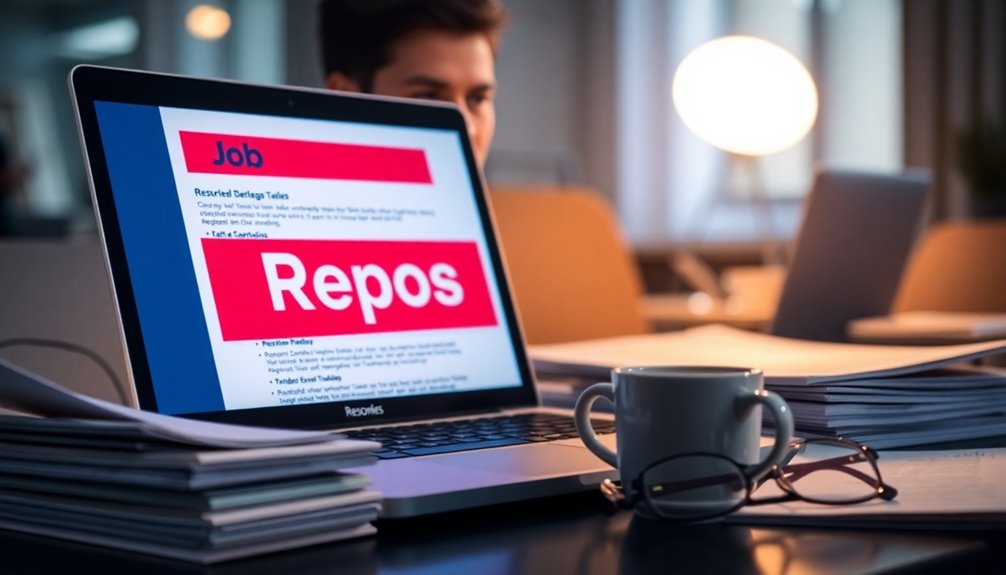Mastering workplace conflict is essential for your career. It's more than just resolving issues; it's about showcasing your unique experiences. When you handle conflicts effectively, you not only demonstrate professionalism but also foster collaboration and improve productivity. Use the STAR method to articulate your experiences clearly in interviews. Remember, your ability to communicate and empathize can set you apart. Share what you've learned and how you've grown from these situations. Your story matters and can have a lasting impact. So, stay tuned for tips on how to turn these experiences into opportunities.
Key Takeaways
- Share personal experiences of conflict resolution to illustrate your skills and growth in handling workplace challenges.
- Highlight the importance of strong communication strategies in understanding different perspectives during conflicts.
- Utilize the STAR method to structure your stories, showcasing your role and the resolution process clearly.
- Emphasize the positive outcomes of resolved conflicts, including enhanced collaboration and productivity within teams.
- Practice active listening and empathy to build trust and rapport, facilitating smoother conflict resolution in future interactions.
Understanding Conflict Resolution Importance

In any workplace, conflicts are inevitable, and how you handle them can greatly impact your career. Demonstrating strong conflict resolution skills not only shows professionalism but also highlights your ability to navigate challenging situations.
Employers often assess these skills during interviews, making it essential for you to articulate your approach to resolving disputes. When you effectively manage conflict, you foster a collaborative environment, enhancing team dynamics and productivity.
Furthermore, understanding conflict resolution prepares you to address issues calmly and constructively, which can lead to personal growth. Remember, your ability to resolve conflicts positively reflects on your overall work ethic, making you a valuable asset to any organization.
Emphasizing these skills during your interview can set you apart from other candidates.
Preparing for Your Interview

While preparing for your interview, it's crucial to approach it with a focused mindset.
Arrive or log in 15 minutes early to settle your nerves and minimize distractions. Turn off notifications to keep your attention on the task at hand. Engage in breathing exercises to maintain calmness as you review your resume, highlighting key experiences and stories that showcase your conflict resolution skills.
Research the interviewer beforehand to identify common interests, helping establish rapport during the conversation.
Navigating Small Talk

Starting a conversation with small talk can set a positive tone for your interview. This initial exchange allows you to ease into the conversation and gauge the interviewer's personality.
Keep it light and relevant; ask about their weekend plans or recent company events. Listen actively to their responses; this shows you're engaged and interested.
Remember, small talk is also a chance to observe the workplace culture. Pay attention to how your interviewer communicates—are they formal or casual? This can help you adjust your tone accordingly.
Avoid controversial topics and focus on shared interests or neutral subjects. Engaging in small talk can also enhance your mental wellbeing, promoting a more relaxed state during the interview.
Mastering small talk not only breaks the ice but also lays the groundwork for a more meaningful conversation about your qualifications and fit for the role.
Discussing Conflict Scenarios

Conflict scenarios often arise in workplace settings, and discussing them effectively during an interview can showcase your problem-solving skills and emotional intelligence. When you talk about a conflict, be clear and concise. Use the STAR method—Situation, Task, Action, Result—to structure your response. Here's a simple breakdown:
| Element | Description |
|---|---|
| Situation | Describe the conflict scenario briefly. |
| Task | Explain your role and responsibility. |
| Action | Detail the steps you took to resolve it. |
| Result | Share the outcome and what you learned. |
| Reflection | Mention any skills you improved or gained. |
Building healthy boundaries in a professional context can also help in managing and preventing conflicts effectively.
Highlighting Outcomes and Growth

Your ability to highlight outcomes and personal growth from conflict situations can greatly impact how interviewers view your problem-solving skills. When discussing conflicts, focus on the tangible results of your actions.
For instance, mention how resolving a dispute led to improved team dynamics or boosted client relationships. Use specific metrics to illustrate your achievements, like completing a project on time or increasing customer satisfaction scores.
Reflect on what you learned and how you've changed since the experience. Discuss strategies you've implemented to prevent similar conflicts in the future.
This not only shows your capacity for self-improvement but also demonstrates your commitment to fostering a positive work environment. Ultimately, sharing these insights reinforces your value as a candidate.
Strategies for Effective Communication

Effective communication plays an essential role in steering workplace conflicts and fostering collaboration. To enhance your communication skills, consider these strategies:
| Strategy | Description |
|---|---|
| Active Listening | Focus entirely on the speaker to understand their perspective. |
| Clear Messaging | Use simple language and avoid jargon to convey your points effectively. |
| Nonverbal Cues | Pay attention to body language and tone to reinforce your message. |
| Empathy | Acknowledge others' feelings to build rapport and trust. |
| Open-Ended Questions | Encourage dialogue by asking questions that invite elaboration. |
Additionally, fostering emotional alignment can significantly improve interpersonal dynamics in the workplace.
Following Up After Interviews

A timely follow-up after interviews can greatly impact your chances of landing the job. Sending a thank-you note within 24 hours shows your appreciation and reinforces your interest in the position.
In your message, mention specific points discussed during the interview to personalize it and remind the interviewer of your strengths. Keep it concise and professional; a few sentences will suffice.
If you haven't heard back within a week or two, consider sending a follow-up email to inquire about the hiring process. This indicates your enthusiasm and keeps you on their radar.
Frequently Asked Questions
How Can I Identify Conflicts Before They Escalate?
To identify conflicts before they escalate, pay attention to changes in team dynamics and communication patterns.
Listen actively to your colleagues and observe non-verbal cues that may indicate tension. Encourage open dialogue and create an environment where team members feel safe expressing concerns.
Regularly check in with your team to address any issues early on. By fostering a culture of transparency, you can catch potential conflicts before they become significant problems.
What Are Some Common Conflict Resolution Styles?
Have you ever noticed how different people handle disagreements? Common conflict resolution styles include accommodating, avoiding, competing, compromising, and collaborating.
Each style has its strengths and weaknesses, depending on the situation. For instance, collaborating often leads to win-win solutions, while avoiding might prevent immediate tension but doesn't solve the issue.
Understanding these styles helps you choose the best approach for resolving conflicts effectively, fostering a healthier work environment for everyone involved.
How Do Cultural Differences Impact Conflict Resolution?
Cultural differences greatly impact conflict resolution styles.
When you engage with colleagues from diverse backgrounds, you might notice varying approaches to disagreement. Some cultures value direct communication, while others prefer indirect methods to maintain harmony.
Understanding these nuances helps you adapt your conflict resolution strategies. By being aware of cultural perspectives, you can foster a more inclusive environment and effectively address conflicts, ensuring that everyone feels respected and understood in the process.
What Role Does Emotional Intelligence Play in Conflict Management?
Emotional intelligence plays an essential role in conflict management. It helps you recognize and understand your own emotions, as well as those of others.
By practicing empathy, you can better navigate difficult conversations and find common ground. When you manage your emotions effectively, it reduces tension, fosters open communication, and encourages collaboration.
Ultimately, enhancing your emotional intelligence equips you with the tools to resolve conflicts more constructively and maintain positive workplace relationships.
How Can I Maintain Professionalism During a Conflict?
To maintain professionalism during a conflict, focus on keeping your emotions in check and communicating clearly.
Listen actively to others' perspectives, showing respect even if you disagree. Use "I" statements to express how you feel without assigning blame.
Stay solution-oriented by collaborating with others to find common ground.
Finally, keep your tone calm and composed; this sets a positive example and encourages a more constructive dialogue, helping resolve the conflict effectively.
Conclusion
In today's cutthroat job market, mastering workplace conflict isn't just a nice-to-have; it's a game-changer. Your story of overcoming challenges can set you apart like a shining beacon in a sea of resumes. Remember, each conflict you navigate is a chance to showcase your emotional intelligence and adaptability. So, prepare to share your experiences in interviews, and turn those past disagreements into powerful narratives that reflect your growth. After all, in the world of work, it's all about the story you tell!









